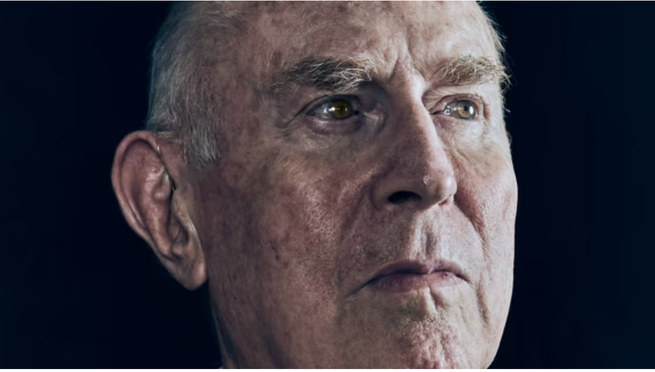This is an edition of the revamped Books Briefing, our editors’ weekly guide to the best in books. Sign up for it here.
The last book I read may be the perfect summer novel, one that almost seems engineered to hit every pleasure center in the brain: Ingredients include a feel-good romance, a bucolic setting, a narrator slowly spilling a story full of bittersweet nostalgia under a beating sun, afternoon swims in a lake, and lots of ripening fruit. I’m thinking of Ann Patchett’s newest novel, Tom Lake. The book was one of my contributions to our summer reading list, which we updated this week with some new titles that are out this month.
First, here are four new stories about books from The Atlantic:
Patchett is perhaps best known for her 2001 novel, Bel Canto, in which hostage-takers and their hostages somehow find common ground. She always seems to want her characters to achieve transcendence, giving them exits from the otherwise messy, dark emotions of life. And Tom Lake is no different. I felt a real strangeness when I realized—and this likely contributed to its light, summery feel—that I was reading about essentially happy, well-adjusted people, the kind you don’t often encounter in contemporary fiction.
The novel’s narrator, Lara, lives with her adoring husband on their cherry farm in northern Michigan. In trapping their three daughters with them as well, the coronavirus pandemic has created a kind of unexpected bliss for the family, and they take on the job of reaping that year’s harvest themselves in the absence of their seasonal workers. To pass the time, Lara begins to unfold a story her daughters have always wanted to hear: about the one summer in her early 20s when she had a relationship with a man, Peter Duke, who would go on to become a very famous actor. The book alternates between the present of a happy family together on the farm and Lara’s recounting of that long-ago time at a summer-stock theater called Tom Lake. She was an actor then, and the story tracks those passionate few months she had with Duke and how it ended, along with her acting career.
There’s little regret or sadness. Lara loves her life; she’s happy with her decision to choose stability and everyday beauty over the intensity that Duke represented. I was lulled, in a good way, by the sweetness of a story that was so sober in its tone.
Other new books on our revisited list include Yunte Huang’s Daughter of the Dragon, a fascinating biography of Anna May Wong, the Asian American film star of 1920s Hollywood who struggled against racism; Emma Donoghue’s new novel, Learned by Heart, about a 19th-century iconoclast who refused to be constrained by the gender norms of the period; and Elizabeth Acevedo’s Family Lore, a sprawling domestic epic about a Dominican family. Our full list contains a lot of recommendations for these last weeks of summer. Check it out, and enjoy!
24 Books to Read This Summer
What to Read
The Lover, by Marguerite Duras
“The Lover is a load of shit,” Duras told a colleague. “It’s an airport novel. I wrote it when I was drunk.” That last sentence is probably true; Duras spent a large portion of her life drinking. But those who have read The Lover recognize the shocking immediacy of its narrator’s perspective, which defies her characterization of her work, and draws from Duras’s remembrance of what her own life was like as an adolescent girl in then-French Indochina (in what is now Vietnam). Like her young narrator, Duras wound up in a relationship with a much older man; however, the author did not write The Lover until she was 70 years old—making the novel’s hypnotic language, combining sharp personal memory with a young person’s scant adult knowledge of love and desire, even more arresting. Only from the vantage of old age can Duras, whose writing consistently deals with sexual and self-possession, recognize that there was some kind of real love between her past self and the older man. — Bethanne Patrick
From our list: You can read any of these short novels in a weekend.
Out Next Week
📚 The Heaven & Earth Grocery Store, by James McBride
📚 I Hear You’re Rich, by Diane Williams
📚 Liquid Snakes, by Stephen Kearse
Your Weekend Read

“The Real Lessons From The Making of the Atomic Bomb,” by Charlie Warzel
I first encountered The Making of the Atomic Bomb in March, when I spoke with an AI researcher who said he carts the doorstop-size book around every day. (It’s a reminder that his mandate is to push the bounds of technological progress, he explained—and a motivational tool to work 17-hour days.) Since then, I’ve heard the book mentioned on podcasts and cited in conversations I’ve had with people who fear that artificial intelligence will doom us all. “I know tons of people working on AI policy who’ve been reading Rhodes’s book for inspiration,” Vox’s Dylan Matthews wrote recently. A New York Times profile of the AI company Anthropic notes that Rhodes’s book is “popular among the company’s employees,” some of whom “compared themselves to modern-day Robert Oppenheimers.”
When you buy a book using a link in this newsletter, we receive a commission. Thank you for supporting The Atlantic.

